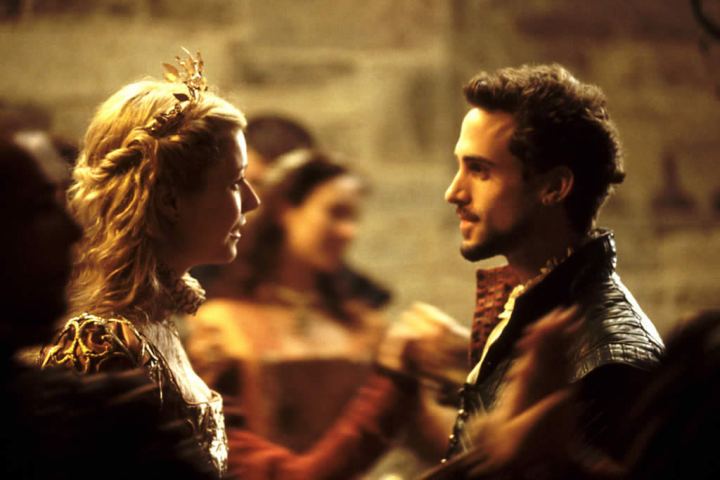The first one this time is Shakespeare in Love.
I am protected by my inability to be too much enamoured of anything this recent from imagining that it was actually any good, though I think it is harmless enough, and unlikely to delude many people into thinking they are cleverer than they are or understand anything important about Shakespeare or literature or English history, which some of the people who do understand these things often seem to worry about. It won the Oscar for Best Picture in its year (1998--I hadn't realized this was that old either--1997 seems to be the cutoff point after which my active participation in life effectively stopped. Everything since then merges together in one amorphous period lacking in any demarcation of time) and is often rated among the worst such winners, though I could probably come up with 10 even lamer ones pretty easily. I don't remember what ought to have won in its place. There were a few things I liked about this movie however, which is what I will emphasize here.
1. The Imagery of Taking a barge down the Thames and debarking at a palatial estate. Preferably your own, though that of a dear friend or lover I suppose would be acceptably pleasant too. They break out this motif in other movies set during the Tudor period, such as A Man For All Seasons, and even now there is the option for tourists of riding a barge down to Hampton Court Palace, which Henry VIII famously accepted as a 'gift' from Cardinal Wolsey in the latter's unsuccesful bid to preserve his head. I admit to finding the prospect of this ride tempting at the time, and the idea of it still stirs my romantic imagination, It is inextricably identified with that age when what we think of more or less as classical England burst forth (from the standpoint of cultural, political and economic power) from the winter of the Middle Ages in all its sunny freshness.
2. Having the Run of One of These Palatial Estates Even For a Short Period. I would almost be content to have this even if I knew beforehand there was to be no possibility of sex/romantic intrigue whatsoever. This has nothing inherently to do with the movie's actual quality again, but is another image of European high civilization served up for middlebrow consumption without any indication of or necessity of undergoing any of the difficult mental work that was required to build and maintain that civilization, which perhaps more than anything in the world drives legitimate intellectuals and artists to absolute fury when it attempts to pass itself off as meaningful or edifying. These homes are central to the cultural and artistic history of every European country, and are replete with significance in all their parts to such as can interpret them. One of the running underlying half-comic themes in Powell and Waugh is that many of these houses (whose numbers are obviously limited) have at any given time fallen--before WWII, still usually through ancestral inheritance at least--into the possession of dull people who are failing to properly maximize these houses' potential as the settings for great social occasions.
3. I Am Always a Sucker For Depictions of Artistic Troupes, Even When Not Romanticized As It is Here. This is because the dream of my life was to be an artist and associate primarily with--indeed live among--artistic people, and needless to say that has not happened. I could not be more estranged from the kind of people whose lives consist of the sorts of things I am actually interested in if I had set out intentionally to avoid them. Seeing the interactions among and processes of theater people, even idealized beyond the point of being interesting to a normal person, warms something in my bone-dead soul that I wish I could bring out into the arena of actual life.
4. I Rather Like the Depiction of Shakespeare That is Offered Here. Even more than with other great authors, the dearth of certain knowledge about Shakespeare seems to encourage people to imagine him, or whoever was the author of the plays published under his name, as a more or less idealized version of their vision of themselves. Individuals not given much to frivolity, such as Henry James, often insist that the author of the 'Shakespeare' oeuvre must have been a figure who emitted an air of gravitas so thorough and imposing as to be quite terrifying and incomprehensible to anyone beneath the most diligently bred and educated quarters of society. I like to think of him as a man with an extraordinary talent not merely for literature but for living, who found means to express that talent from the very midst of the tumult of life rather than as an aloof, calculating pure genius of intellect surveying humanity from a perch of consciousness far removed from tumult. I take that to be the spirit in which this character was written, and I think it came off reasonably well.
5. I Was Not Able to Hate Ben Affleck, Eager as I Was to do so. I can see what people mean when they say he can't act, but I didn't think he was that bad, he was certainly trying, and he seemed pretty good-natured. I know good-naturedness is no substitute for talent or skill, but on the whole I don't think his presence detracted that much from the movie.
A Private Matter (1992)
The main rating book I am using must have a different person critiquing TV movies and programs than whoever is doing the regular films, because on several occasions it has given a pedestrian TV movie a 5-star ranking while grading some groundbreaking European masterpiece or other a mere 4 or 4 and a half. This movie was well-made, and everything in it looks good--it is set in Phoenix, Arizona in 1962, when that city/region was around 1/10? 1/20? the size that it is now, and before the complete perfection of the antihuman, corporate-inspired architecture of sprawl that has prevailed for most of my life. Sissy Spacek is the star, and I don't know how old she was at the time--she looks to be around the same age I am now (ed--she was 42)--but she looks great as a 1962 version of an ubermom, and of course she's a swell movie actress, indeed one of the few Baby Boomer stars I actually like (it takes a lot to get me to admit that). There was not anything even quirkily brilliant or thrilling about it that I am going to remember in a month, however. Aidan Quinn plays the husband and he is kind of blandly creepy and insubstantial, as indeed are pretty much all the men, and most of the women too for that matter, except for Sissy Spacek, which gives a hint I think as to what is wrong with the movie.
The film is based on a factual (I think) incident, in which the host of the children's TV show Romper Room, who already had four children, got pregnant again, was told that there was a likelihood due to some defective medicine she took as a sleeping aid that the baby would be severely retarded and was persuaded by several male doctors to make arrangements to (quietly) abort the baby. Unfortunately the media got wind of the story, the woman became for a short time a pariah, she of course lost her position on the television show, and her medical situation became much more problematic, since nobody in the United States would agree to perform the procedure now out of fear of all the negative publicity. In case you haven't guessed, the movie has a decidedly pro-choice message, the transmission of which was the overarching concern of the screenwriters. The good Romanian film I referenced a few weeks ago, Four Months, Three Weeks, Two Days, also centers around an abortion which is illegal and puts its women characters in a really terrible position, but it is still primarily about its particular characters and the society which they inhabit. The abortion is the crisis through which various aspects of these are revealed, and it is probably a symbol, but it is not in itself the object of either moral or political crusade, or outrage; and as such the circumstances in which it occured rendered the characters involved and their situation more sympathetic than in the typical Hollywood social justice movie.
Hollywood social outrage movies, and this even includes Holocaust films, have always been marred by various blindnesses, but one of the major ones is the seeming inability to identify at all with whatever force or ideology is the designated enemy of the idea it wants to push. Whether it is Nazis, southern racists, paternalistic males, greedy capitalists or whomever, they are presented as creatures of a mindset of such thorough evil as to be completely unfathomable to any decent person watching the movie, and great emphasis is made of their awesome and wholly impersonal and merciless power, whose origin is so remote from its victims that it can only be expressed by terrifying images. This is a highly unsatisfying way of understanding such matters, and this mindset has no doubt contributed to the particular political and social problems which afflict this country.
Zelig (1984)
I'm not in Woody Allen mode at the moment. I have my own existential problems, and currently they seem to me to be more serious than his do. I like the idea of the roaring 20s homage. I usually like the idea in Woody Allen movies. He has similar interests to me. This movie just wasn't funny or clever enough.
The movie is made in a mock documentary fashion and there were a number of cameos by famous writers. Saul Bellow, who would have been about 68 at the time, was one of them, and he looked great. But the real coup de grace was Bruno Bettelheim, who I had not realized had still been alive at this time, and even then never imagined that he knew Woody Allen or would have deigned to have anything to do with such a low form as the popular cinema.
Experience Preferred...But Not Essential (1983)
British TV production, where it was called First Love. Not sure what necessitated the name change, unless there some worry about it being confused with the Brooke Shields catastrophe Endless Love, which came out around the same time. I could not find any uploadable picture of it. It doesn't seem to be out on DVD, and I had to buy an old VHS tape to see it. Here's a clip from the beginning.
I have to say, I liked this quite a lot. It's not a sweet movie, exactly--most of the lives depicted in it are about equal parts grim and hopeless by our standards--but it has a certain good nature and spiritedness that is appealing. Most of the characters, the women especially, try in their own ways to enliven and make as good a go as they can of what are not very promising situations. It probably helps the story that no one in it is married or has any children--this leaves them available for sex and the attendant sexual tension that inhabits places where even passably attractive single people congregate. The movie is set in--yes--1962 (was that a great year or what?) in a third rate seaside hotel in Wales, so we are talking about not particularly good-looking British people having not particularly good pre-60s liberation sex, but, as I have written elsewhere, something about it is not completely unappealing. Recommended.












